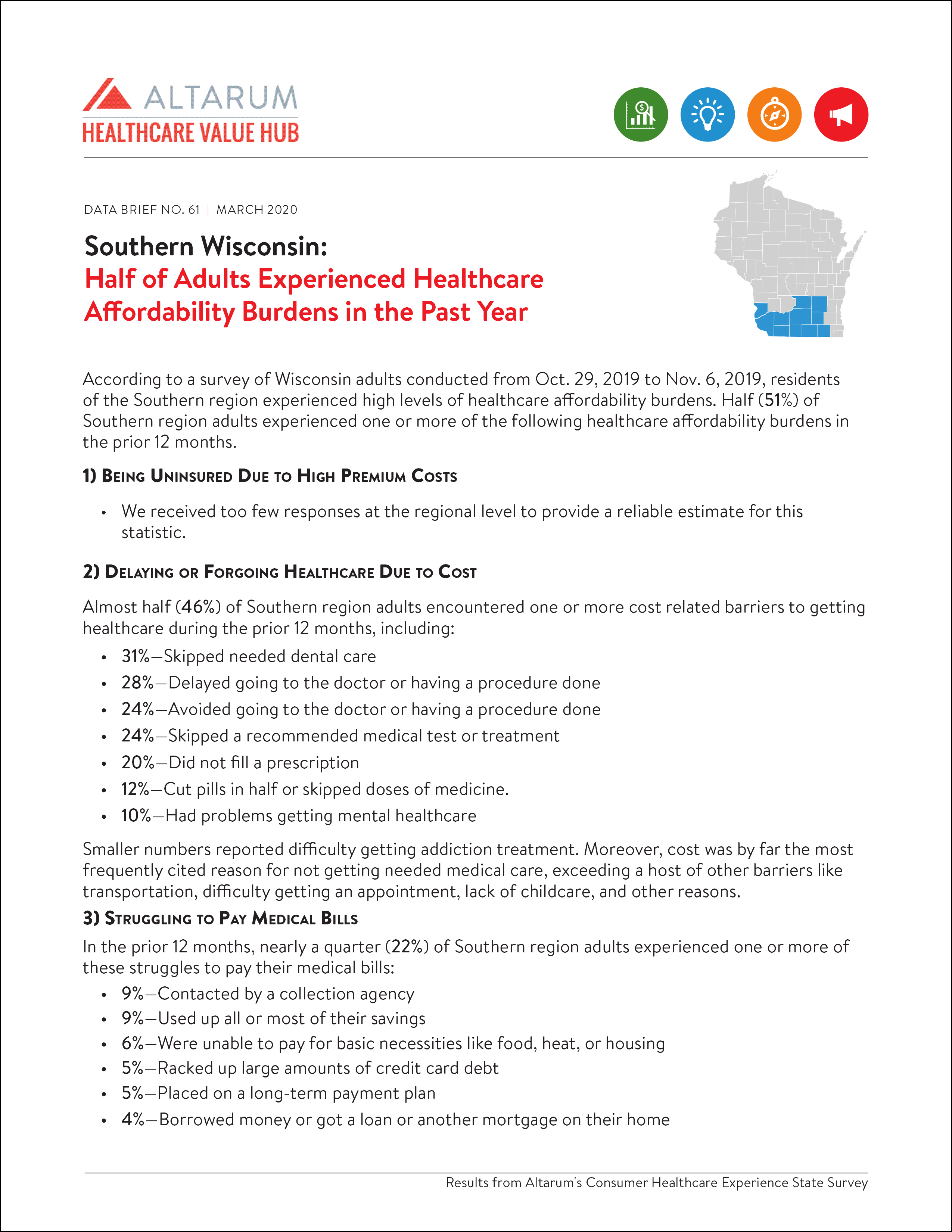Southern Wisconsin: Half of Adults Experienced Healthcare Affordability Burdens in the Past Year
According to a survey of Wisconsin adults conducted from October 29, 2019 to November 6, 2019, residents of the Southern region experienced high healthcare affordability burdens. Half (51%) of Southern region adults experienced one or more of the following healthcare affordability burdens in the prior 12 months.
1) Being Uninsured Due to High Premium Costs
We received too few responses at the regional level to provide a reliable estimate for this statistic.
2) Delaying or Forgoing Healthcare Due to Cost
Almost half (46%) of Southern region adults encountered one or more cost-related barriers to getting healthcare in the prior 12 months, including:
- 31%—Skipped needed dental care
- 28%—Delayed going to the doctor or having a procedure done
- 24%—Avoided going to the doctor or having a procedure done
- 24%—Skipped a recommended medical test or treatment
- 20%—Did not fill a prescription
- 12%—Cut pills in half or skipped doses of medicine.
- 10%—Had problems getting mental healthcare
Smaller numbers reported difficulty getting addiction treatment. Moreover, cost was by far the most frequently cited reason for not getting needed medical care, exceeding a host of other barriers like transportation, difficulty getting an appointment, lack of childcare, and other reasons.
3) Struggling to Pay Medical Bills
In the prior 12 months, nearly a quarter (22%) of Southern region adults experienced one or more of these struffles to pay their medical bills:
- 9%—Contacted by a collection agency
- 9%—Used up all or most of their savings
- 6%—Were unable to pay for basic necessities like food, heat, or housing
- 5%—Racked up large amounts of credit card debt
- 5%—Placed on a long-term payment plan
- 4%—Borrowed money or got a loan or another mortgage on their home.
High Levels of Worry About Affording Healthcare in the Future
Residents of the Southern region also reported high levels of worry about affording healthcare in the future. About seven in ten (72%) of respondents reported being "worried" or "very worried" about one or more of these topics: affording nursing home and home care services (66%); health insurance becoming too expensive (62%); cost when elderly (62%); costs of a serious illness or accident (59%); cost of needed dental care (51%); prescription drug costs (48%); and losing health insurance (35%).
Dissatisfaction with the Health System and Support for Change
Residents of the Southern region of Wisconsin were extremely dissatisfied with the health system. Just 20% agreed or strongly agreed with the statement “We have a great health care system in the U.S.,” while 77% agreed or strongly agreed with “the system needs to change.”
Respondents do see a role for themselves in solving problems. They reported actions they have already taken, like researching the cost of a drug beforehand (41%), as well as actions they should be taking—57% believe that taking better care of their personal health is one of the top things they can do personally to address affordability.
But in far greater numbers they saw a role for their elected representatives. Examples of strategies that received support across party lines included (Total/Republican/Democrat/Neither):
- Show what a fair price would be for specific procedures—(95%/93%/96%/95%)
- Prohibit drug companies from charging more in the US than abroad—(95%/92%/96%/94%)
- Require insurers to provide upfront cost estimates to patients—(94%/94%/94%/95%)
- Set standard prices for drugs to make them affordable—(94%/92%/97%/91%)
The high burden of healthcare affordability along with high levels of support for change suggest that elected leaders and other stakeholders need to make addressing the cost of healthcare a top priority. Annual surveys can help assess whether or not progress is being made.
Note: For survey methodology and state-wide data, see https://www.healthcarevaluehub.org/Wisconsin-2019-Healthcare-Survey/







